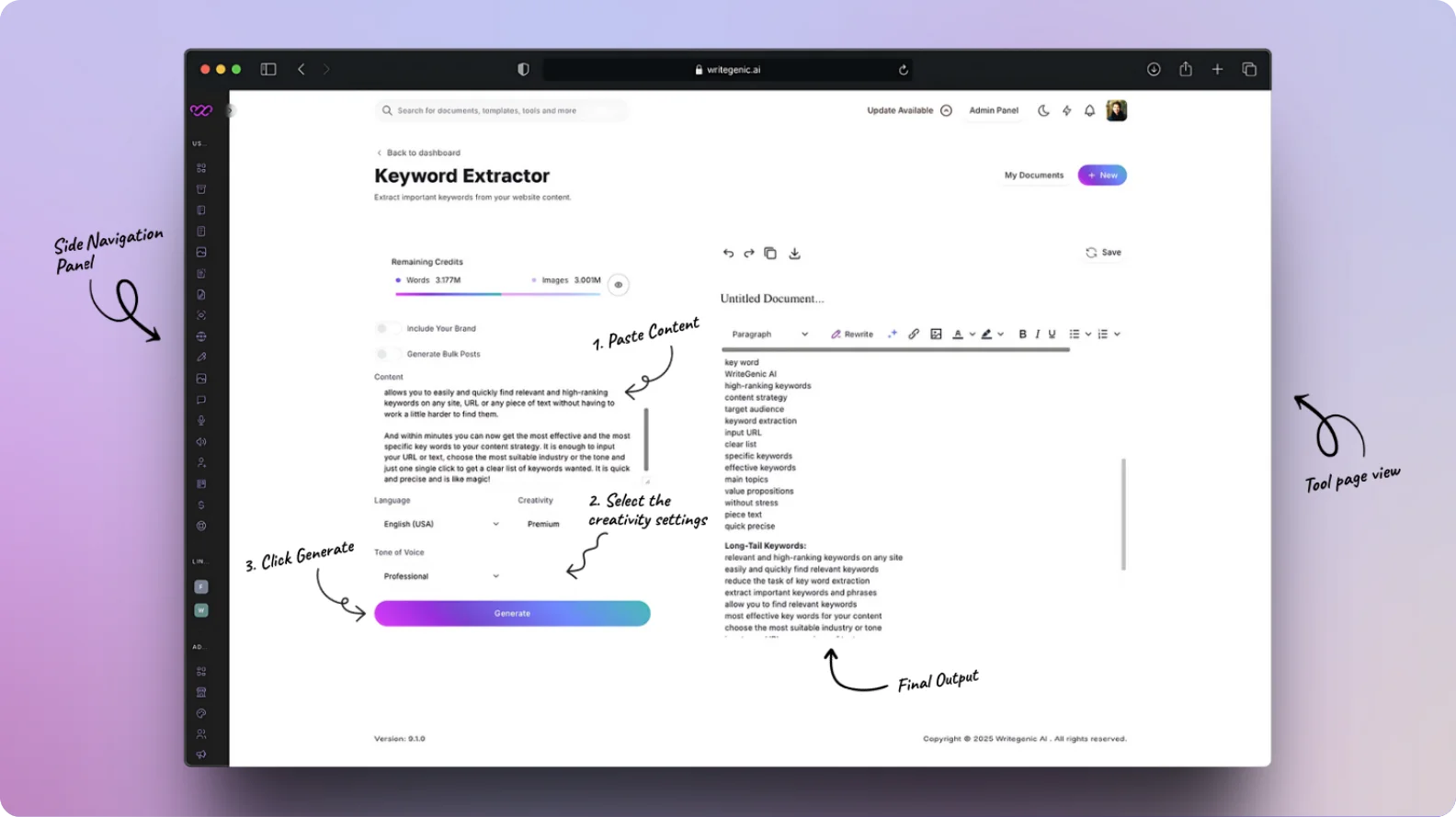Keyword Extractor Guide: How Search Algorithms Work

In the digital era, it is important that businesses and those who make content perceive how search algorithms work, and a keyword extractor can help in that endeavor.
The core of this knowledge is the keyword extractor which is a potent tool and is used by marketers and SEO experts in determining the pertinent keywords that they can use to optimize the exposure of their content.
Through the use of a keyword extractor, creators are able to solve the language puzzle attracting more traffic and ranking high during search processes. Search engines are constantly changing, so it is not only advantageous to use a keyword extractor, but it is necessary in keeping with the competition in the online market.
Statistics reveal that 93% of online activities start with a search engine and the most critical factor when using search engines is using keywords.
Three-fourths of the users do not go beyond the first page of the results, which explains the importance of sound keyword optimization. Basic implementation of such things as a keyword extractor into the content strategy can provide the business with an idea of which words and phrases will appeal to the target audience.
A good keyword extractor helps the users to determine trending keywords, search intent and finally to perfect their contents. That can result in higher interaction rates and rates of conversion, which demonstrates the importance of such tools in an online environment that is becoming more competitive.
Table of Contents
What Is a Keyword Extractor?
A keyword extractor is a tool that reads a text and extracts keywords and phrases that describe the key issues of the text, whether it is a body of documents or of web pages. It makes it easier to determine what words are most essential in SEO and in content marketing strategy.
A keyword extractor will be able to identify such relevant keywords through the analysis of keywords on the basis of frequency of usage, relevance, and search volume using advanced algorithms.
Functionality of Keyword Extractors
The functionality of keyword extractors is to crawl on text and extract keywords according to several criteria. They can detect trends, e.g., the frequency of words, with regard to each other, which enables them to deduce the significance of particular terms.
The use of keyword extractors in both single words and multi-words enables proper development of a list of all relevant keywords that could be used to develop content strategies.
- Analyze frequency of key terms
- Determine relevancy based on context
- Categorize keywords for targeted campaigns
How Do Search Algorithms Use Keywords?
The search algorithms are mainly dependent on keywords in providing the most useful results to the users. When a user inputs a search request, the algorithms analyze indexed materials to identify matches using keywords, which enables the user to retrieve what they desire within the shortest time.
An effective keyword strategy can directly affect page rankings, thereby becoming an imperative tool in the hands of people who are interested in improving their level of online presence.
The Role of Keywords in Ranking
Keywords are used as the connection between what people are searching and what businesses are selling. To rank pages, search engines not only check mentions of a keyword but also strategic usage of the word in titles, header and the text itself.
As an example, words used in title tag or meta description are in most cases more effective than those referred to in the text.
- Keywords in titles enhance discoverability
- Contextual use of keywords boosts relevance
- Correctly placed keywords improve SERP rankings
Methods to Extract Keywords from Websites and Text
The process of extracting keywords out of the text or even sites is multiple, and its complexity along with its efficacy is subject to some variations. The manual way of doing it is reading the material and reading out the important words, whereas the automated ones make this easier.
Hybrid techniques also exist where freedom to human insight and automated procedures are married resulting to improved results.
Manual Keyword Extraction
Extraction is done manually and it takes longer time however it provides more insight. Reading through content does not merely allow marketers to know the frequently-used vocabulary, but also the finer details and background that would be lost with automated tools.
This approach may be useful in long-tail content in which intent use of keywords matters.
- Read content carefully for insights
- Identify context beyond keyword frequency
- Can yield unique, niche-specific terms
Automated Keyword Extraction Tools
Automated tools can be used to analyze large blocks of text quickly and identify key words. These tools employ the algorithm where trends and relevancy during the search are considered and thus are effective in terms of SEO strategies.
Competitive analysis is also conducted by many keyword extractors detailing what the competitors are ranking on.
- Analyze large datasets rapidly
- Provide keyword density statistics
- Offer insights into competitive landscape
Benefits of Using a Keyword Extractor Tool
The use of a keyword extractor will benefit you in a lot of ways and mainly in enhancing your SEO activities. Through proper keywords, businesses are able to come up with a well targeted campaign that will bring on board the audience seeking it.
Such targeting can be reflected by increased conversions and engagement indicators.
Enhancing Content Quality
With the help of a keyword extractor, you are likely to make your content better. Learning about keyword relevance, marketers could write articles, blog posts and web pages, which communicate better with searchers. This will guarantee not just attraction of traffic but also conversion of traffic to their own business objectives.
- Improve content relevance
- Increase user engagement
- Better match user intent
Competitive Advantage
Companies that utilize keyword extractors understand their competitors. This gives the brands a chance to find unused markets and niches where they can outperform the competitors by doing some research on their keyword strategies. This competitive insight constructs a superior SEO strategy that can be used to increment the market share.
- Identify competitive keywords
- Uncover market opportunities
- Stay ahead in SEO strategies
Top Tools to Extract Keywords from a URL or Website
A number of keyword extractor tools can be found that meet varying needs, at varying cost levels. To perform some basic work or carry out a large research program, find some tool that will gladly contribute to the fulfillment of your plans.
Popular Keyword Extractor Tools
The famous keyword extractor tools are Google Keyword Planner, Ahrefs, and SEMrush. All of them present various functions, including keyword volume monitoring, other competitors’ data, and more, giving the user valuable information that can be utilized in their future SEO campaign.
- Google Keyword Planner: Free with Google Ads, great for basic research.
- Ahrefs: Offers in-depth analysis of competitor keywords.
- SEMrush: Comprehensive suite for keyword research and SEO analysis.
Specialized Tools
Other tools such as Keyword Tool and Moz can be of assistance when it comes to niche requirements. These tools are specific and can enable users to investigate the possibility of long-tail along with a more detailed look at particular keyword sets.
- Moz: Known for its domain authority metrics.
- Keyword Tool: Generates keyword suggestions based on Google’s autocomplete.
Extracting Keywords in Minutes Using WriteGenic AI
We have reduced the task of key word extraction and eliminated the stress of extracting the keywords manually. Using WriteGenic AI allows you to easily and quickly find relevant and high-ranking keywords on any site, URL or any piece of text without having to work a little harder to find them.
And within minutes you can now get the most effective and the most specific key words to your content strategy. It is enough to input your URL or text, choose the most suitable industry or the tone and just one single click to get a clear list of keywords wanted. It is quick and precise and is like magic!

Step-by-Step: How to Use a Keyword Extractor
In order to make the best use of a keyword extractor, go through a methodology. First, you need to choose the appropriate tool that will suit you and then insert your content or URL in the extractor. Once you have the keywords, you need to analyze their relevancy, search volume, and competitiveness and then add it to your game plan.
Detailed Steps for Extraction
- Choose a Tool: Select a keyword extractor that aligns with your goals.
- Input Content: Paste your text or URL into the tool.
- Analyze Results: Review the extracted keywords and focus on their relevance.
- Ensure your keywords align with user intent.
- Prioritize keywords with high search volume but low competition.
- Regularly update your keyword lists to stay relevant.
Optimization Strategies
Once you have identified your keywords it is advisable to optimize your content so that your identified keywords are incorporated naturally in your headers, sub headers and even within body texts. Pay attention to the flow because it is needed to make it more readable but also good to contribute to the SEO.
- Use keywords in title tags and meta descriptions.
- Maintain keyword density between 1-2%.
- Avoid keyword stuffing to keep content readable.
Best Practices for Keyword Extraction and Optimization
It is important to use the best practices that have been tested over time in order to best exploit keyword extraction. The practices not only limit the visibility of their contents but also guarantee that the content would continue to be user-endearing and useful.
Continuous Learning and Adapting
The digital environment runs constantly and keeping updated with the most recent trends in SEO can significantly contribute to your approach. Become involved with real-time data, conduct regular reviews of your plans and make amendments where necessary.
- Subscribe to SEO newsletters.
- Participate in webinars or workshops.
- Analyze competitor strategies regularly.
Audience-Focused Content
Always have the interest of your audience in mind when developing the content. Use the words that have been extracted to answer their questions and needs directly. This is used to make sure that the content is up-to-date and favorable so that users can spend more time in your site.
- Create content that answers audience queries.
- Incorporate multimedia for better engagement.
- Regularly update content to keep it fresh and relevant.
Final Thoughts
In the current environment of digital marketing, it is important to learn how search algorithms operate using keywords. A keyword extractor not only makes the process of discovering good keywords easy but also allows a business to take full advantage of business content. Keyword relevance and search tactical positioning can help greatly increase internet presence and interaction.
To sum it all up, since we are able to accept the complexity of keyword extraction, its room to grow and increase is unlimited. Being a competent marketer or a new author, you can change the paradigm of content generation and advance your company in the digital age by using keyword extractors.
FAQs
What is a keyword extractor?
A keyword extractor helps recognize the significant words out of text or URLs to improve SEO and content strategies.
How do search algorithms use keywords?
Search algorithms rely on the keywords and match the queries made by the user to the related material according to the indexed information.
Can I manually extract keywords?
Of course, it is possible to examine the content manually in order to determine important keywords depending on the context.
What tools are best for keyword extraction?
Some of the popular tools are Google Keyword Planner, Ahrefs, SEMrush, and Moz.
How does keyword relevance affect SEO?
Relevant keywords optimize your content to deliver enhanced visibility and even search result ranking.

